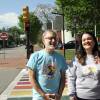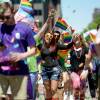After a three-year hiatus, Boston will once again host a Pride parade and festival. This Saturday, a parade will travel from Copley Square to Boston Common to celebrate Pride Month.
It wasn’t an easy road to bring back the Pride festival. In 2020, organizers were criticized for not including people of color and trans people in the organizing committee and subsequent parades were canceled. In the aftermath, a new group, Boston Pride for the People, formed to pick up the pieces of Boston’s central Pride event.
“We had to be the ones to create something for our city where we all could feel included, and respected and accepted,” Adrianna Boulin, president of Boston Pride for the People, told Boston Public Radio on Friday.
Organizers started meeting weekly with LGBTQ+ community members in September 2022 to figure out what a more inclusive celebration would look like.
“Pride for the People [is] setting a precedent of how to be inclusive of everyone under the umbrella,” said Chastity Bowick, who is a member of the Boston Pride for the People organizing committee and co-founder of Trans Resistance MA. She said this means letting marginalized communities, like trans women of color, have a voice in what they want Pride to look like.
“Pride can be bittersweet for us,” Bowick said as the trans community remembers trans lives lost. Some studies estimate transgender people are four times more likely than cisgender people to be victims of violent crime. “We want to have a safe zone,” she said.
More Local News
Boston Pride for the People activities will commemorate lives lost to homophobic violence. “Pride started as a protest,” Boulin said, referencing the 1969 Stonewall riots that inspired today’s Pride events. There will also be a push to educate the community about threats to LGBTQ+ freedoms, including the rise in anti-LGBTQ legislation in state legislatures.
And, too, Boston Pride for the People will create spaces of celebration.
“We are worthy of celebration and joy as LGBTQ+ communities,” Boulin said. “And what that will look like tomorrow ... is a parade that looks like the communities we’re looking to support and center.”
On top of the parade, two festivals will take place starting at noon on Saturday with activities and spaces for all ages. Boston Common will have an LGBTQ+ and BIPOC marketplace, an aging and older adult area as well as space for family and youth. The festival at City Hall Plaza will serve adults over 21, with a DJ, a beer garden and live entertainment.
When thinking about corporate sponsorship to fund this year’s events, Pride for People vetted business to make sure they aligned with the organization’s founding principles of supporting LGBTQ+ people. This involved looking at the Human Rights Council’s corporate equality index and whether the company had donated to anti-LGBTQ or anti-abortion funds.
If a company doesn’t pass this vetting, Boulin said, “We have a conversation and share with them how they can be genuine allies.”
In Massachusetts, political leaders have pledged support of the LGBTQ+ community. Gov. Maura Healey is the first openly gay governor in the commonwealth, and Boston Mayor Michelle Wu announced an office focused on LGBTQ+ residents. But Boulin and Bowick say this is only a start — and during campaign season, Bowick says, the LGBTQ+ community gets a lot of “lip service.”
“So now that we have two powerful women in office, I’m going to be holding them accountable to make sure they provide more resources,” Bowick said.
In her mind, the most important need for the LGBTQ+ community is housing. It’s a major component of health and wellness, she said. Trans people especially can face discrimination in the shelter system, Bowick said.
“If it wasn’t for the Trans Emergency Fund, I probably wouldn’t be here with you all today. ... We need to make sure that we have the right funding for these resources,” said Bowick, who formed and now leads the fund. “It got me off the streets.”
It can be difficult to keep up the feeling of celebration against the backdrop of anti-LGBTQ political pushes, a tightrope walk that Boulin finds herself often staring down.
“It’s not easy to be a community that is experiencing and oppressed in all these different ways dependent on our intersectional identities, and still trying to express joy,” Boulin said. “It’s a superpower that our community has.”








